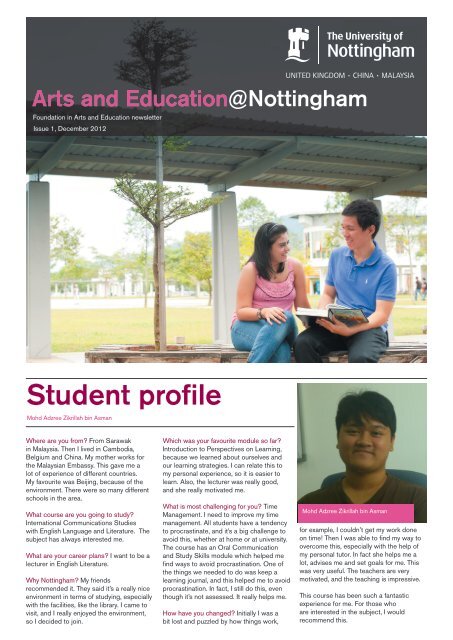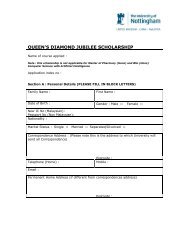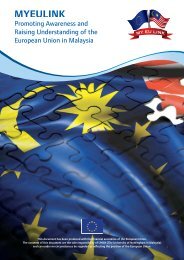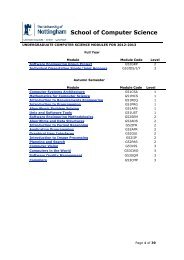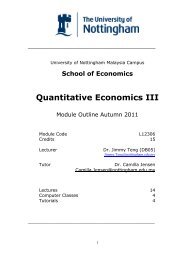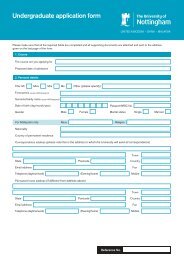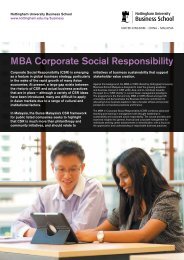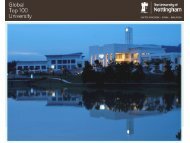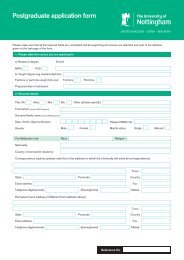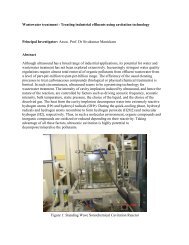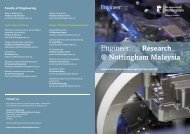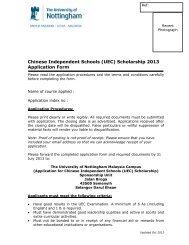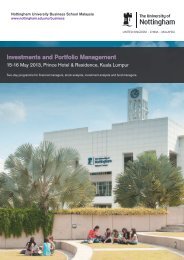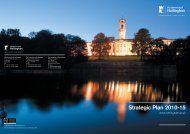Student profile - The University of Nottingham, Malaysia Campus
Student profile - The University of Nottingham, Malaysia Campus
Student profile - The University of Nottingham, Malaysia Campus
Create successful ePaper yourself
Turn your PDF publications into a flip-book with our unique Google optimized e-Paper software.
Arts and Education@<strong>Nottingham</strong>Foundation in Arts and Education newsletterIssue 1, December 2012<strong>Student</strong> <strong>pr<strong>of</strong>ile</strong>Mohd Adzree Zikrillah bin AsmanWhere are you from? From Sarawakin <strong>Malaysia</strong>. <strong>The</strong>n I lived in Cambodia,Belgium and China. My mother works forthe <strong>Malaysia</strong>n Embassy. This gave me alot <strong>of</strong> experience <strong>of</strong> different countries.My favourite was Beijing, because <strong>of</strong> theenvironment. <strong>The</strong>re were so many differentschools in the area.What course are you going to study?International Communications Studieswith English Language and Literature. <strong>The</strong>subject has always interested me.What are your career plans? I want to be alecturer in English Literature.Why <strong>Nottingham</strong>? My friendsrecommended it. <strong>The</strong>y said it’s a really niceenvironment in terms <strong>of</strong> studying, especiallywith the facilities, like the library. I came tovisit, and I really enjoyed the environment,so I decided to join.Which was your favourite module so far?Introduction to Perspectives on Learning,because we learned about ourselves andour learning strategies. I can relate this tomy personal experience, so it is easier tolearn. Also, the lecturer was really good,and she really motivated me.What is most challenging for you? TimeManagement. I need to improve my timemanagement. All students have a tendencyto procrastinate, and it’s a big challenge toavoid this, whether at home or at university.<strong>The</strong> course has an Oral Communicationand Study Skills module which helped mefind ways to avoid procrastination. One <strong>of</strong>the things we needed to do was keep alearning journal, and this helped me to avoidprocrastination. In fact, I still do this, eventhough it’s not assessed. It really helps me.How have you changed? Initially I was abit lost and puzzled by how things work,Mohd Adzree Zikrillah bin Asmanfor example, I couldn’t get my work doneon time! <strong>The</strong>n I was able to find my way toovercome this, especially with the help <strong>of</strong>my personal tutor. In fact she helps me alot, advises me and set goals for me. Thiswas very useful. <strong>The</strong> teachers are verymotivated, and the teaching is impressive.This course has been such a fantasticexperience for me. For those whoare interested in the subject, I wouldrecommend this.
<strong>Student</strong>s visit to localprimary schoolStaff <strong>pr<strong>of</strong>ile</strong>:Mike GrovesHead <strong>of</strong> Foundation in Arts and EducationOn 2 November, a group <strong>of</strong> foundation,undergraduate and postgraduate studentsvisited a local school, St Paul’s Primary inSeremban. <strong>The</strong> group included foundationstudents on the Education Pathway.During the visit students led a motivationalworkshop with some <strong>of</strong> the pupils at theschool. <strong>The</strong>ir lecturer, Dr Lucy Bailey, said:“It was a great opportunity for real, practicaleducation, to complement what they havebeen learning in their lectures and tutorials.”<strong>The</strong> school children were very excited bythe visit. “It gave the children a wonderfulmorning, and motivated them to succeed,”said Dr Bailey.Our foundation students found the day veryrewarding. “<strong>The</strong> kids were so energetic, andI was surprised by their ambitions,” saidNur Erleena binti Zuki. Course mate DavidChin said: “It was exciting to learn so much,especially about how creative the studentswere.”Module <strong>pr<strong>of</strong>ile</strong>:Oral communication and study skills<strong>The</strong> Oral Communication and Study Skillsmodule is a core module for all studentson the Foundation in Arts and Education,with three main areas <strong>of</strong> focus. In the first,the students learn the skill <strong>of</strong> note making.<strong>Student</strong>s learn how to make effective notesfrom lectures, something that they <strong>of</strong>tenhave problems with. As student Sa’adAl Mukhaini said: “It helps us to be moreefficient, to know what we need to writedown.”In addition, the students learn presentationskills. Many undergraduate courses assesstheir students through the use <strong>of</strong> academicpresentations, so it is very helpful for thestudents to learn and practise this vital skill.<strong>Student</strong> Rafiqah Binti Abdul Ghani, said:“It helps you build confidence.” This is veryimportant for all modules.<strong>The</strong> third area is that <strong>of</strong> Global Issues,especially population and poverty - an area<strong>of</strong> learning that the students consider veryimportant. “It’s something we knew aboutbefore,” said student Priscilla Pillai, “but it’sNur Erleena Binti Zuki, Emma Chen and DavidChin Ka Wainot something we ever paid much attentionto.” Banuwat Kangthong added: “It’s thebackground knowledge <strong>of</strong> what you aregoing to learn.”Overall, the module provides the studentswith important skills as well as theknowledge to help them with their futurestudies.Group study in the libraryWhy did you come to UNMC? I hadbeen working on the UK campus on theirfoundation course, when the decision wastaken to set up the Arts and Educationfoundation in <strong>Malaysia</strong>. It was a challengethat I was very happy to take up.How has the course changed since youhave been here? We started with only sixstudents, and now we have over 60. Also,we have students from more countries,and different backgrounds. This meansthat the students have a very internationalexperience from the first day <strong>of</strong> their course.What do you enjoy about your job? I alwaysenjoy teaching students, but more than that,it’s watching them change and develop.<strong>The</strong>y tend to come to the foundation unsure<strong>of</strong> what is expected <strong>of</strong> them at university.But, after a year, they leave with a lot moreconfidence, as well as the skills to excel attheir undergraduate studies.What do <strong>Malaysia</strong>n students need from afoundation course? I think for many students<strong>of</strong> their age, time management is an issue.We try to train the students to break largetasks down into manageable chunks, sothey can better work with their time. Also,we spend a lot <strong>of</strong> time training students incritical thinking. We don’t just ask them tolearn information — we ask them to analyse,and come up with their own analysis, takingthem step-by-step through the process <strong>of</strong>critical thinking, developing their autonomy.What about outside work? Like mostEuropeans in <strong>Malaysia</strong>, I love the culture <strong>of</strong>cuisine, and spend a lot <strong>of</strong> time eating inrestaurants. I also love travelling around thecountry and have been to every <strong>Malaysia</strong>nstate except Perlis. Whenever I can, I try toget to the coast for a relaxing weekend.Contact usIf you have any enquiries, please contact us:t: +6 (03) 8924 8000e: enquiries@nottingham.edu.mywww.nottingham.ac.uk/foundation/artswww.nottingham.ac.uk/biology Printed December 2012 5


